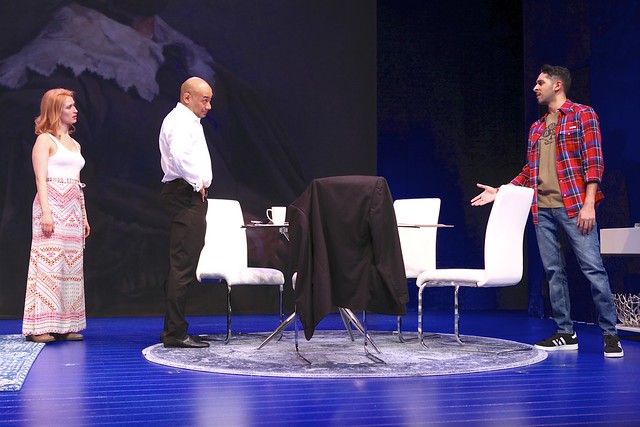
Syracuse Stage's 'Disgraced' more timely than ever
January 28, 2017
Disgraced – written by Pakistani-American playwright Ayad Akhtar and directed by May Adrales – could not have arrived at Syracuse Stage at a more fitting time, when everyone is struggling to find their bearings in Trump’s America.
The play opens as pretentious and disconnected jazz plays in a spacious yet soulless Upper East Side apartment, lined with chic white furniture and solid blue walls. Visible only to the audience, a colossal “Portrait of Juan de Pareja” hangs over the back wall and serves as an important accessory in the understanding of the play.

Artist Emily (portrayed by Victoria Mack) paints her husband Amir Kapoor (Andrew Ramcharan Guilarte) in the style of the famous 15th century work, in which Spanish artist Diego Velázquez captured his slave’s dignified expression. The racial tension between the couple is palpable as Kapoor poses in his underpants to humor his WASP wife, blurring the line between muse and slave.
Amir, an American Muslim, is a merger and acquisitions expert who is on the fast-track to become a partner in his Jewish law firm. A self-proclaimed apostate, he has abandoned his “backward” Islamic faith in order to lead a convenient life, even replacing his obviously Muslim last name for a common Punjabi name.
Emily, on the other hand, debates with her husband. She defends Islam and finds “beauty and wisdom in Islamic tradition.” Although she borrows from it for her paintings, her admiration does little to shroud her patronizing attitude.
After abandoning his former life and religious identity, a reluctant Amir is forced by Emily and Abe, his assimilated nephew, to appear in court on the defense counsel of a local imam. Abe fears the imam maybe a target of religious persecution, and has been imprisoned on charges that he may be financing terrorist groups.
This episode sets the ball rolling, as Amir’s worst fears start surfacing. Most of the action takes place at a dinner where Emily and Amir host Jory (Gillian Glasco), Amir’s African-American colleague from work, and her Jewish husband, Isaac (James Ludwig), who is also Emily’s art dealer and a curator at the Whitney Museum of American Art.
After knocking back a few drinks and engaging in New York-style repartee, the quartet sit down to enjoy fennel and anchovy salad. But by then, the veneer of civility has been lacerated to reveal primordial tendencies. Conversation soon spirals from Magnolia’s Bakery cupcakes and Cubs games to the Taliban, 9/11 and Benjamin Netanyahu.
The characters spew politically incorrect statements and step on social landmines. It is unsettling and harrowing to watch as they battle over religion, fidelity and identity – and realize the fragility of the American dream.
Akhtar’s fast-paced and incisive writing rattles the ideological cage, and expertly dramatizes the complex nature of identity and the unswerving need to belong. The expert writing evokes both visceral and cerebral reactions.
Guilarte as Amir is charismatic and, having played this character before in another production at Atlanta’s Alliance Theater, has a strong grip on his character’s internal conflicts. It is heartbreaking to watch as Amir realizes he will always be a second-grade citizen in a country in which he struggles to belong.
The strong chemistry between the leads solicits emotional investment from the audience. Mack gives a heartfelt performance as Emily as she grapples with her weaknesses and maintains her love for Amir.
Rounding out the cast, Glasco is confident as the accomplished lawyer and has a great comic timing. Sadhnani, as impulsive Abe, shows a range of emotions as he adeptly showcases a fundamentalist in making. Ludwig as Isaac, the pretentious curator and later incendiary contrarian, did elicit a few laughs but wasn’t convincing as he hurled abuses at the closet-jihadist.
As director, Adrales runs a tight ship and fulfills the demands of the script. She exercises restrain as she expertly directs the violent and climatic scenes without it ever being too much. Lee Savage should be lauded for his exquisite and innovative set design, which adds another dimension to the play.
Disgraced may seem to have an incomplete denouement, one without resolutions; it raises more questions than it answers. The piercing silences in the play are unnerving, but force self-reflection. In an interview, Akhtar said he is not a spokesperson but an observer. But Adrales hopes to inspire a dialogue through these observations. And inspire, it does.
More by this author
Related tags
Popular tags on recent stories
By visiting this site, you agree to the Terms of Use
Produced by S.I. Newhouse School of Public Communications,
Syracuse University, 215 University Place, Syracuse, NY 13244







Post new comment